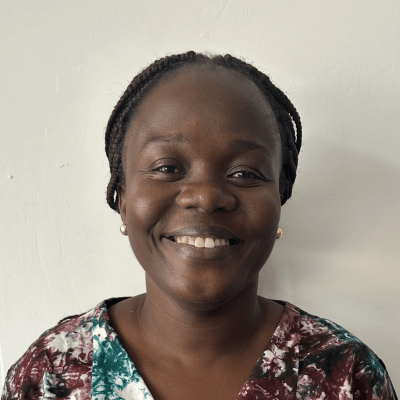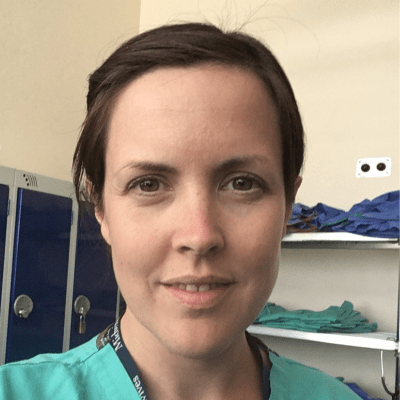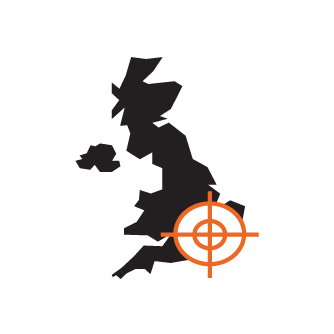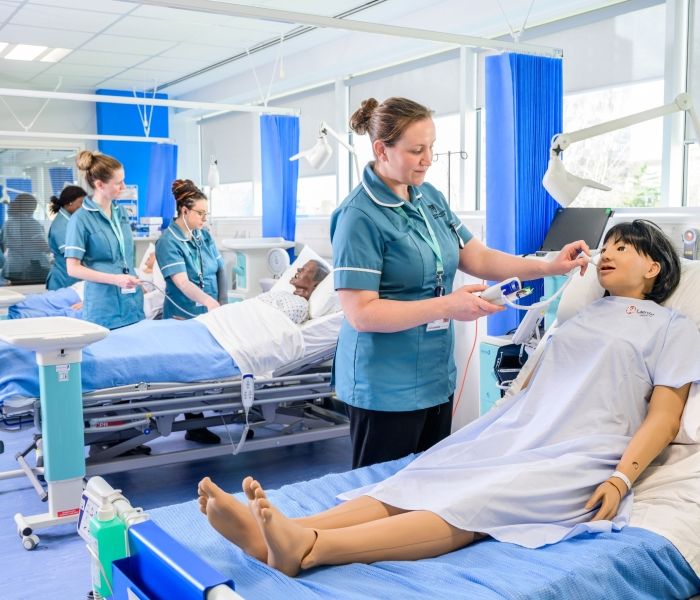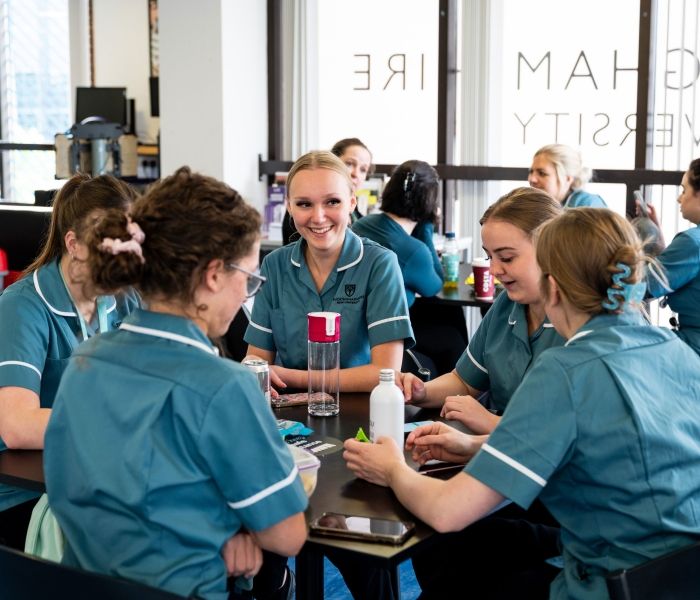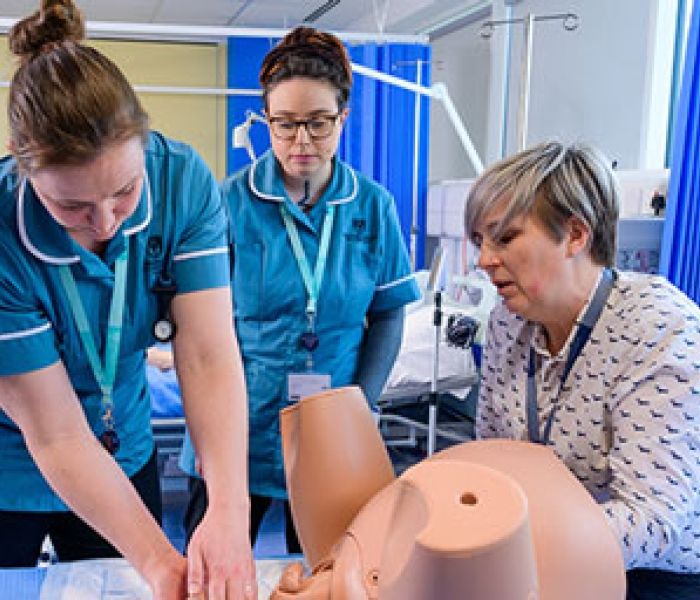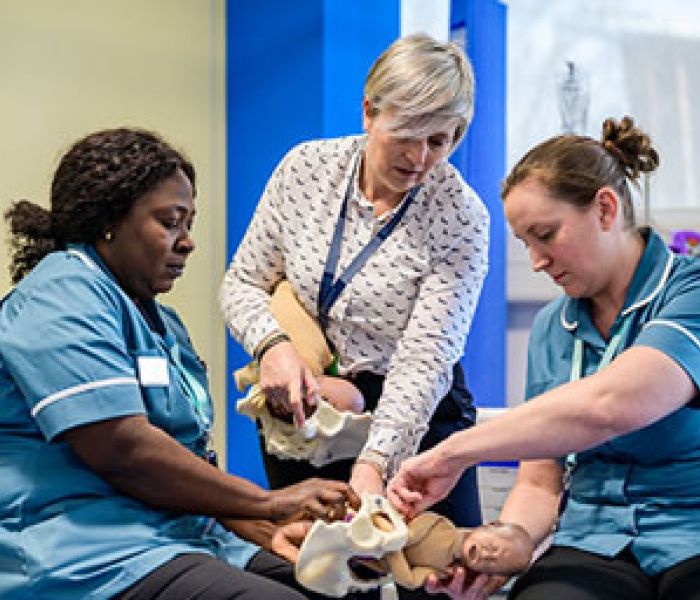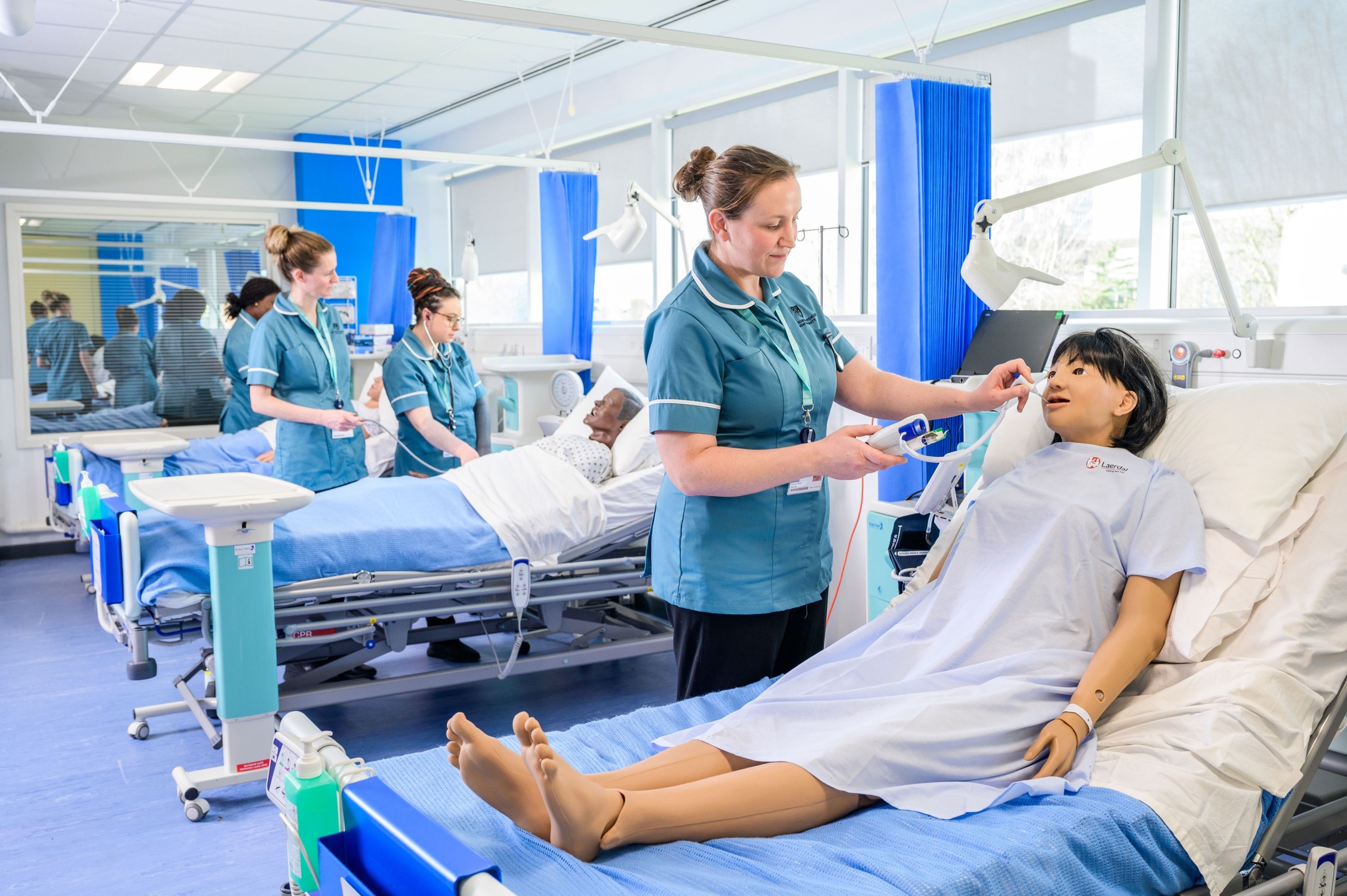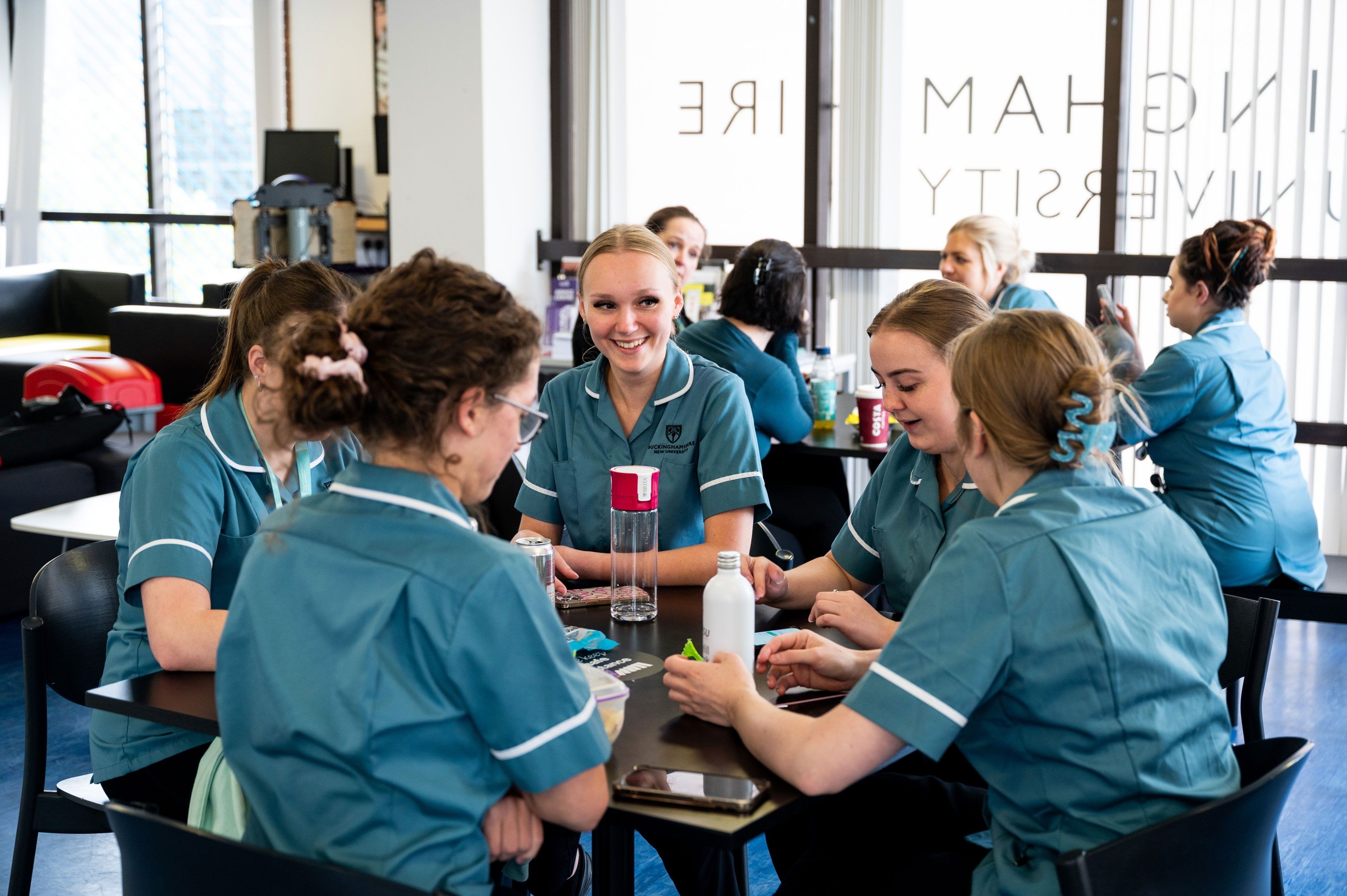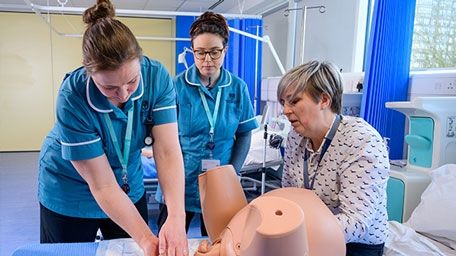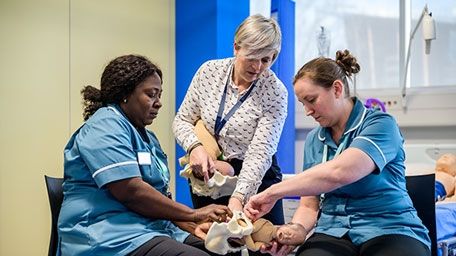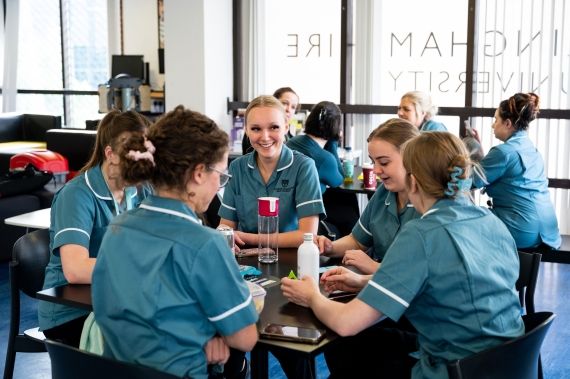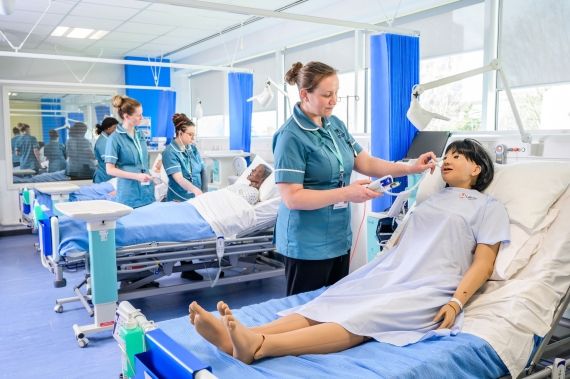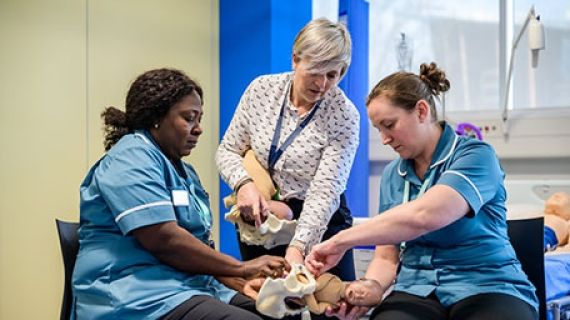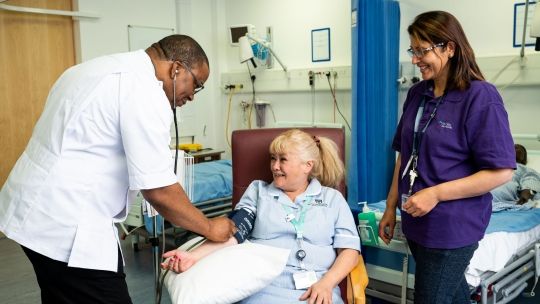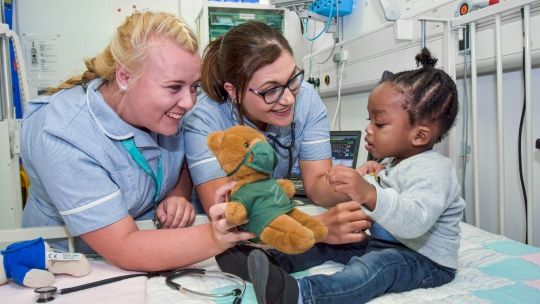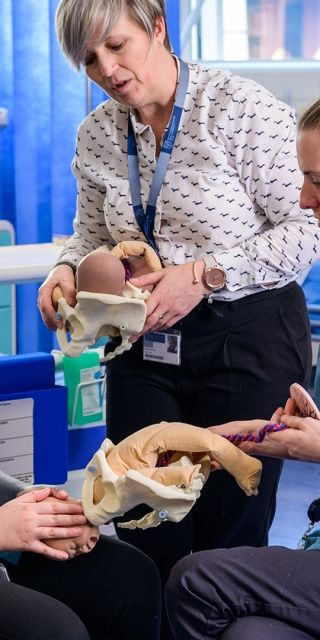
BSc (Hons) Midwifery
- Study Mode: Full Time
- Location: Uxbridge / Aylesbury
- Duration: Three or Four Years
- Start Date: September 2026
At BNU, we’ll help prepare you for your career in midwifery so you can then help parents through one of the most vulnerable times in their lives and meet the growing demand for midwives.
You’ll benefit from our combined learning approach of theory and practice, supportive and experienced course team, and our specialist facilities. Upon completion of the degree, you’ll be eligible to register with the Nursing & Midwifery Council.
* Please note the Foundation Year of this course is Subject to Validation.
I feel an overwhelming sense of pride, gratitude, and awe to have walked this path. Being part of BNU’s very first midwifery cohort wasn’t just about learning the craft. It was a powerful, personal journey through uncertainty, perseverance, and growth. We were pioneers, and with every challenge we faced, the university stood beside us.Junia Noel Midwifery Alumni
What will I study?
At BNU, you will gain the skills and knowledge that will help you to become a competent, confident and compassionate midwife able to provide sensitive, evidence-based and person-centred care.
Throughout this programme you will develop an understanding of pregnancy, labour, birth and the postpartum period on the early weeks of life and the longer-term health and well-being of society.
Throughout the degree, you’ll develop your skills to build effective relationships, working in partnership with women and their families to:
- provide safe and compassionate maternity care
- demonstrate sensitive and systematic knowledge
- show a detailed understanding of the physical, psychological, social, cultural and spiritual factors that may affect the maternity journey.
Designed in collaboration with practice partners, service users and the University, our degree focuses on:
- continuum of care
- Optimise physiological processes, whilst ensuring that students are equipped to recognise when processes run outside of our scope
- supporting safe physical, psychological, social, cultural, and spiritual situations
- working to promote positive outcomes and to anticipate and prevent complications.
You will also gain the skills to support all aspects of infant feeding and understand the long-term implications on infant development, and the wider health of society.
On successful completion of this degree, you will also be able to demonstrate a critical understanding of the processes, resources and policies influencing organisational change, within healthcare, utilising developments in digital health technology.
As a qualified midwife, you will also be able to promote, protect and advocate for the public health needs of women, newborns and their families, using evidence-based practice to mitigate against health and social inequalities.
Our experienced and supportive lecturers are passionate about midwifery and maintain close links with practice, ensuring that the programme is always kept up-to-date. In addition, guest speakers will deliver sessions, so you can benefit from their specific experiences, expertise, and insights.
At BNU, we recognise roles in this field are hands-on – that’s why you’ll take part in simulated learning experiences throughout the course using our specialised facilities. This will enable you to recreate authentic scenarios and practise your skills in a safe environment.
As a BNU student, you will automatically become a member of Bucks Students’ Union giving you access to a wide range of services that we offer for free. You’ll also be able to join the Midwifery Society where you’ll have the ability to attend a variety of extra-curricular activities and events.
Half of your time on the course will be spent on a clinical placement with local trusts across a wide range of maternity services. Our students are highly respected whilst out in practice.
The NHS Trust we are currently working with for clinical placements include:
- Buckinghamshire Healthcare NHS trust
- Frimley Health NHS Foundation Trust (Wexham Park and Frimley Park)
- Royal Berkshire NHS Foundation Trust
- Milton Keynes University Hospital NHS Foundation Trust
As part of your placement, at some point during your programme you will be expected to experience leadership in another hospital trust to ensure that you gain experience and leadership with different maternity providers.
At both our Uxbridge and Aylesbury campuses, we have impressive facilities with state-of-the-art equipment. You’ll get to recreate real scenarios in realistic ‘wards’ so when you’re out on placement you’ll be familiar with your surroundings and be confident in your midwifery skills.
With our simulation facilities, you’ll be able to learn and practice with equipment that is as close to the real thing as possible, enabling you to build your skills and knowledge in a safe environment.
Our equipment is replicated exactly on both sites, ensuring that all students get the same opportunities, and occasionally will come together for vital shared learning experiences. Find out more about our Uxbridge and Aylesbury simulation suites.
How will I be taught and assessed?
At BNU, we utilise a variety of blended learning and teaching methods including:
- seminar-based teaching
- lectures
- authentic scenarios and case studies
- presentations
- online learning resources
- peer learning
- reflection
- role modelling
- simulation.
To complement the academic sessions on campus, you are required to undertake independent study which will include further reading, utilising the University Virtual Learning Environment (Blackboard™), professional websites, academic databases, and library resources.
Simulation, utilising our impressive facilities, will help build your expertise and develop the behaviours you’ll need in your future career as a midwife. It will incorporate the use of high and low fidelity simulation for a fully-immersive training environment. Within this learning environment, real-time evolving clinical situations can be simulated, repeated and evaluated using reflection and debriefing. This will help build your confidence as well as develop your critical thinking and problem-solving skills with the potential to gain proficiency in essential midwifery skills.
The simulation areas are equipped to a high standard, offering a range of equipment that is endorsed by PROMPT™, in line with local trust partner training requirements. The essential element of de-brief in simulation is undisputed; audio/visual technology (smots™/CCTV) is available and widely used by the teaching teams to enhance feedback to students.
BNU students are always of great quality, they make a difference in the trust, work hard and are motivated. The relationship that they have between university and the trust is shown throughout their training. They're great students that are taught to a high standardRebecca Lea Learning Environment Lead for Milton Keynes University Hospital
You will benefit from theory and placement blocks, so you can apply, and reflect, on clinical practice within your academic studies. In your first year, there will be more of a focus on the theory elements to help build your confidence. As you progress to your second year, there is more of a balance theory/practice split. In your final year, there is more of a focus on clinical placement to help develop you for autonomous practice and your future career as a midwife.
As midwifery professionals and educators, staff within the College of Health and Society bring a wealth of clinical expertise and research activity. In addition to our experienced and supportive teaching team, field specific/interprofessional academics and specialist guest speakers will also deliver tailored sessions. This will allow you to benefit from their experiences, expertise, insights and perspectives. There will also be opportunity to have shared learning with other healthcare students throughout the programme.
I’m loving the Midwifery course – the blended learning, teaching staff and organisation of the course as a whole has been brilliant!Nealy Collins
You will be supported every step of your journey towards becoming a proficient and caring midwife. There’s a range of support services you can access across the University. You’ll also be able to turn to personal tutors, module leaders and course leaders for advice and guidance. In practice, you will remain supported by personal tutors and course leaders, in addition to practice supervisors, practice assessors and academic assessors. Additionally, in practice, you are supported through practice visitor activities.
We’ve ensured that the assessments are varied and relevant to the practical elements of the course and your future profession, and include:
- essays/written assessments
- OSCE’s (Observed structured Clinical Examinations’)
- VIVA’s (Voiced Examination)
- presentations
- digital video uploads
- case study.
In your practice placements, you are assessed using the NMC approved national practice document, the MORA (Midwifery Ongoing Record of Achievement), by Practice assessors, who are appropriately trained registered midwives.
What are the course entry requirements?
A typical offer will require a UCAS tariff score of: 112 - 136 (Full-time) or 48 - 88 (Foundation Year)
UCAS points can be obtained through qualifications such as A levels, T levels, BTEC or an Access to Higher Education course in a relevant subject. Please list all your qualifications on the application form as you will be asked to provide copies when we receive your application.
- An Access to Midwifery qualification can also be accepted.
- You may find it easier if you have prior knowledge of health/healthcare so we prefer if you have relevant A-Levels, such as: Biology, Health and Social Care, Chemistry, Psychology, Physics, Physical Education, and Sociology. However, it is not essential to have these qualifications.
- In addition, you will require five GCSEs including Maths, English and Science at Grade C/4 or above (or equivalent).
- T levels: Minimum Merit overall in Health pathway subject (Health, Healthcare Science, Midwifery and Science).
- Applicants will also be required to pass an interview.
- The government has said it will remove the proposed legal requirement to have COVID-19 vaccinations to work, or attend placements, in health and social care. We & our practice partners continue to encourage you to get vaccinated for your & others' safety.
English language requirements
For those whose first language is not English, there is a requirement to demonstrate proficiency in written and spoken English through application and interview. An IELTS score of 7.0 overall with no section below 6.5 or an equivalent is also required. Find out more on our general entry requirements page.
Modules
This provides a guide of the modules that make up your course. You can find more information about how your course is structured on our Academic Advice section.
What are the tuition fees
Home
-
Home Foundation Year, Academic Year 2026 - 2027: £9,790 *
-
Home, Academic Year 2026 - 2027: £9,790 per year *
International
-
Overseas/International Foundation Year, Academic Year 2026 - 2027: £15,910 *
-
Overseas/International, Academic Year 2026 - 2027: £15,910 per year *
Please note all of the 2026/27 academic year fees stated are subject to parliamentary procedure. Tuition fees are expected to increase each academic year in line with the maximum permitted value set by the Government for that academic year. The expected rise for Home undergraduate students (including those on a foundation year course), may impact both new and continuing students.
What are my career prospects?
Throughout your time with us we’ll support you on the route to your chosen career. We’ll help you to develop crucial skills, encouraging you to become enterprising and skilled leaders and support you in your search to find employment after graduation. For more information, have a look at our Careers and Employability section.
Many midwives choose to become part of the core staff required in hospitals, however, there are a vast array of roles which midwives can choose to specialise in, such as:
- Diabetes
- Safeguarding
- Bereavement
- Vulnerable client groups
- Consultant midwives
- Education
- Multiple pregnancy midwives
- Specialist screening.
Some students also choose to continue their studies with a Master’s in Midwifery or other advanced postgraduate programmes available, leading to careers in midwifery leadership or research.
The lecturers have been incredibly supportive and helpful and created an environment where it has been enjoyable to learn the foundations for, what can be, a challenging career. The best advice a lecturer has given me during the course is "You get out of it what you put in". This has never been more true.Jennifer Brown
Course leader
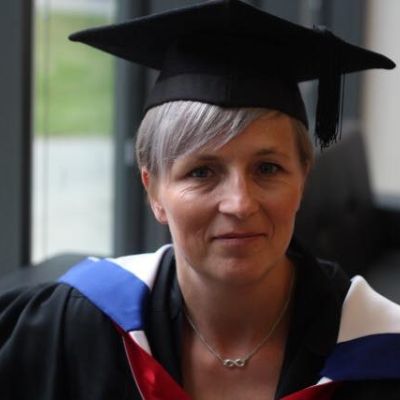
- Associate Professor
- Head of Midwifery
- LME (Lead Midwife for Education)





